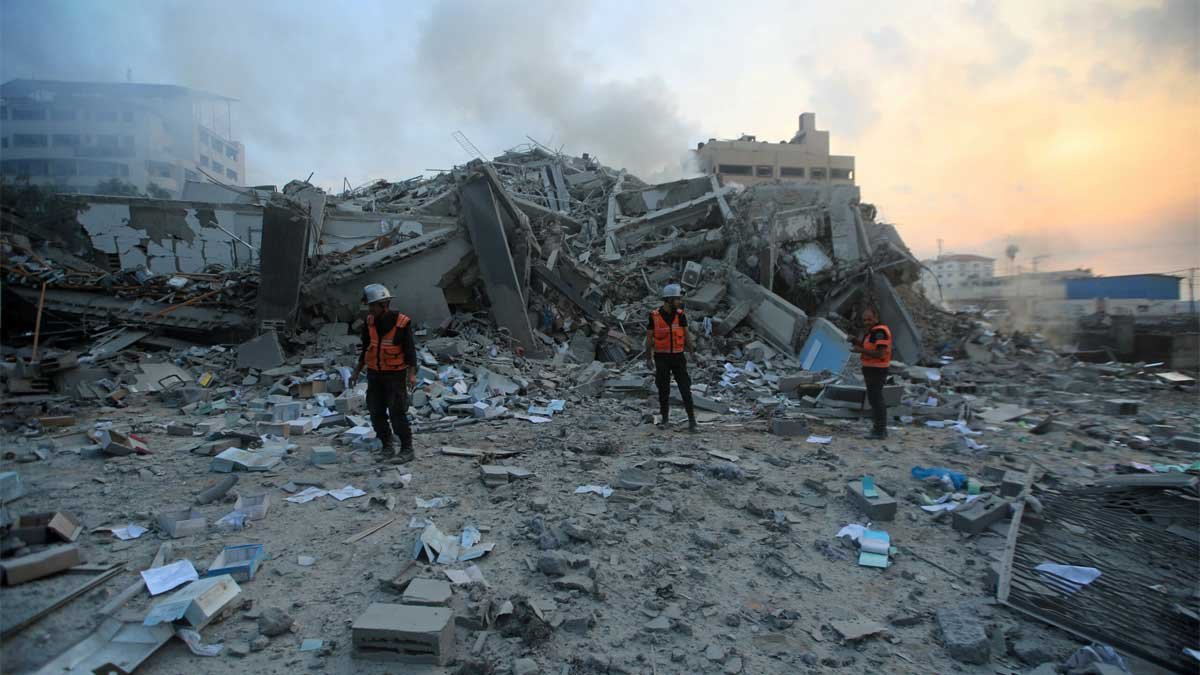Tuesday, January 30, 2024
Year : 2, Issue : 5
by Bernie Sanders
Many of us are watching with horror the severe humanitarian catastrophe unfolding in Gaza. Unfortunately, too many of my colleagues in the House of Representatives and US Senate are choosing to ignore this reality and evade their congressional responsibilities.
Let’s be clear: what’s happening in Gaza is not just some unfortunate tragedy taking place thousands of miles from our shores. The United States provides Israel with $3.8bn in military aid every year, and the bombs and military equipment that are destroying Gaza are made in America. In other words, we are complicit in what is happening.
And what’s happening is unspeakable.
My staff and I have spoken in recent days with the United Nations, the World Food Programme and other humanitarian organizations struggling to deal with the disaster in Gaza.
The bottom line is this: the coming weeks could mean the difference between life and death for tens of thousands of people. If we do not see a dramatic improvement in humanitarian access very soon, countless innocent people – including thousands of children – could die of dehydration, diarrhea, preventable diseases and starvation.
The World Health Organization predicts that the number of deaths from sickness and starvation could exceed the very high number killed in the war thus far.
And let’s be clear: this is not a natural disaster. It is a human-made crisis. This is the direct result of choices made by political leaders, none more than Benjamin Netanyahu, the leader of Israel’s extreme rightwing government.
Hamas began this war with its horrific terrorist attack on 7 October, which killed 1,200 innocent Israeli men, women and children, and took 240 hostages. Israel had the right to respond to that attack and go to war against Hamas. It did not and does not, however, have the right to go to war against the entire Palestinian people – which is exactly what is happening.
More than 25,000 Palestinians have been killed in this war, and 62,000 wounded – 70% of whom are women and children. Thousands more are believed to be trapped under the rubble. At least 152 UN aid workers have been killed so far, more than in any previous war.
Unbelievably, 1.7 million people have been driven from their homes, almost 80% of the entire population of Gaza. These are people who were already impoverished and who are now living in crowded UN shelters or out in the open in winter conditions. They lack adequate food, water, fuel and medical supplies. And they have no idea what the future holds for them.
About 70% of the housing units in Gaza have been damaged or destroyed. Most of Gaza’s critical infrastructure has been made inoperable – including many water wells, bakeries, power plants and sewage treatment facilities. Much of the area has been without cellphone service for weeks, making communication extremely difficult.
Water is scarce, and what little is available is often contaminated. Public wells are operating at just 10% capacity, and only one of three water pipelines into Gaza is functioning. For several months now, children in southern Gaza are surviving on 1.5-2 liters of water per day, far less than what is needed. And that is in the area where UN aid can be delivered. The situation is worse elsewhere.
The lack of clean water is leading to a spike in waterborne diseases and diarrhea – a very serious condition that accounts for nearly 10% of all deaths among children under the age of five worldwide. In Gaza, the UN reports 158,000 cases – more than half among children under the age of five – a 4,000% increase from before the war. Humanitarian groups say they fear many thousands of children will die from diarrhea before they starve to death.
Hunger and starvation are now widespread. Before the war, Gaza had 97 bakeries – just 15 are now operating, and none are functioning in the north, closed by the combination of airstrikes and a lack of fuel and flour. Hundreds of thousands of children go to sleep hungry each night, and desperate people are mobbing the few relief trucks that can reach beyond the border crossing.
Right now, the UN says that 570,000 people in Gaza are facing “catastrophic hunger” equivalent to famine. This is the most severe category of starvation, but the UN reports that “the entire population of Gaza – roughly 2.2 million people – are in crisis or worse levels of acute food insecurity”. Virtually every household is regularly skipping meals, and most are down to a single meal a day, often just bread.
Experts say infants and young children will succumb first to hunger. Without enough food, or with no clean water to make formula, their vital organs will begin to shut down. Many will die of infection before they reach that point. The technical term for this stage – child wasting – is too horrific to contemplate. Yet that is what we are watching unfold in slow motion as the world looks on.
Gaza’s healthcare system is under tremendous strain. Most healthcare facilities are inoperable or functioning at diminished capacity. Faced with tens of thousands of casualties, health workers have, with enormous courage, struggled to save lives amid frequent bombardment in overcrowded hospitals without electricity or adequate fuel or medicine. Three hundred and thirty-seven health workers have been killed.
The lack of basic necessities and overcrowded conditions are contributing to a dramatic increase in disease, and 10% of the population now has acute respiratory infections. Those with long-term conditions that require advanced treatment have little hope of receiving adequate care.
Amid this devastation, approximately 180 women give birth in Gaza every day, receiving completely inadequate medical care. Without enough food or clean water, let alone necessary medications and antibiotics, many of these women face serious complications, and their children will bear lifelong scars from this war.
That is life in Gaza today. The American people must not ignore it. The Biden administration must not ignore it. Congress must not ignore it.
We also cannot ignore what is causing this disaster. And the answer is pretty clear: at every step, the Israeli government has failed to provide even the most basic protections to civilians. Every humanitarian move has been extracted only after weeks of delay and outside pressure from the United States and others.
The result is that today just 20%-30% of what is needed is being allowed in. Not enough food. Not enough water. Not enough medical supplies. Not enough fuel.
Onerous Israeli border inspections are a major cause of this crisis. Today, there is a three- to four-week wait for trucks to get into Gaza. Many trucks are unloaded and reloaded numerous times, often to be searched for the same items. Israel is rejecting items like tent poles, feminine hygiene kits, hand sanitizers, water-testing kits and medical supplies. If a single item is rejected, the truck has to go back to the start of the process. The Kerem Shalom crossing, the main entry point equipped to process trucks in large numbers, is only open eight hours a day.
It is hard to see this process and not conclude that it’s a deliberate effort to slow humanitarian aid. And sure enough, just last week, Netanyahu said that Israel is only allowing in the absolute minimum amount necessary.
When trucks do eventually get across the border, they face a new set of problems. Israel is bombing targets across Gaza, and its ground forces have closed many major roads amid the fighting. The process for coordinating aid convoys with the Israeli military has broken down, and the first half of January actually saw a deterioration in humanitarian access.
So let’s be clear: Netanyahu’s rightwing government is starving Gaza. Israel’s indiscriminate bombardment and restrictions on essential humanitarian aid have created one of the most severe humanitarian catastrophes of recent times.
For months, the United States government has pleaded with Israel to take urgent steps to avoid further civilian death. But despite these requests, including from President Biden himself, Netanyahu has done nothing.
That has to change now. Tens of thousands of lives hang in the balance, and every day matters.
This war is being fought primarily with US arms and equipment. That means the United States is complicit in this nightmare. We must end it. The United States has to use its leverage to make Netanyahu change his approach.
As part of that effort, I have tried to force what I consider to be a very modest step in the US Senate: a resolution requiring the state department to report on any human rights violations that may have occurred in Israel’s military campaign in Gaza. The resolution is based on longstanding US law requiring that any security assistance or military equipment provided to any country be used in line with internationally recognized human rights.
Sadly, only 11 senators voted for this first congressional effort to hold Israel accountable, but the momentum is shifting. More and more Americans – and more elected officials – understand that we cannot continue turning a blind eye to the suffering in Gaza. Given the scale of the disaster unfolding with American bombs and military equipment, Congress must act.
Prime Minister Netanyahu recently said, while rejecting a two-state solution, that “the prime minister needs to be able to say no, even to our best friends”. Well, now is the time for the United States to say no to Netanyahu.
Congress is now considering a supplemental bill with another $14bn in military aid for Israel. The United States must make it clear to Netanyahu that we will not provide another dollar to support his inhumane, illegal war. We must use our leverage to demand an end to the indiscriminate bombing, a humanitarian ceasefire to allow aid to flow to those who are suffering and the release of the more than 130 hostages still being held in Gaza. And we must demand that the Israeli government take steps to lay the groundwork for a two-state solution.
The United States must stop asking Israel to do the right thing. It’s time to start telling Israel it must do these things or it will lose our support.
Author is a US senator, and chair of the Senate health, education, labor and pensions committee. He represents the state of Vermont, and is the longest-serving independent in the history of Congress.
Courtesy by The Guardian





